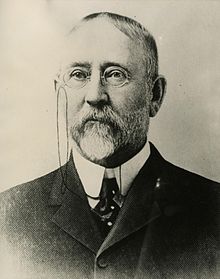Eugene Semple: Difference between revisions
→Further reading: rm blog, WP:SPS |
|||
| Line 46: | Line 46: | ||
*{{cite book|author=[[Edmond S. Meany|Meany, Edmond S.]]|title=Governors of Washington : territorial and state|publisher=University of Washington,|year=1915}} [http://www.secstate.wa.gov/history/publications_detail.aspx?p=30 Available online through the Washington State Library's Classics in Washington History collection] |
*{{cite book|author=[[Edmond S. Meany|Meany, Edmond S.]]|title=Governors of Washington : territorial and state|publisher=University of Washington,|year=1915}} [http://www.secstate.wa.gov/history/publications_detail.aspx?p=30 Available online through the Washington State Library's Classics in Washington History collection] |
||
*{{cite web| last =Willis | first =Steve (Stevenl) |date 2007-11-12<!--, 3:12 pm -->| url=http://olyblog.net/ungovernor-1889-eugene-semple | title= OlyBlog: Ungovernor, 1889 - Eugene Semple | accessdate =2010-12-05}} |
|||
{{WATerrGovernors}} |
{{WATerrGovernors}} |
||
Revision as of 00:30, 21 January 2011
Eugene Semple | |
|---|---|
 | |
| 13th Governor of Washington Territory | |
| In office 1887–1889 | |
| Preceded by | Watson C. Squire |
| Succeeded by | Miles Conway Moore |
| Personal details | |
| Born | June 12, 1840 Bogotá, Colombia |
| Died | August 28, 1908 San Diego, California |
| Political party | Democrat |
| Spouse | Ruth A. Lownsdale |

Eugene Semple (1840–1908) was the thirteenth Governor of Washington Territory and the unsuccessful Democratic candidate to be the first governor of Washington State.
Early life
Eugene Semple was born in Bogotá, Colombia, on June 12, 1840, to then minister to the Republic of New Granada, James Semple.[1] The older Semple later served as chief justice to the Illinois Supreme Court and as U.S. Senator.[1] The younger Semple received his education in Illinois before attending law school at St. Louis Law School.[1] In 1864, Semple moved to Portland, Oregon, where he was editor of the Oregon Herald and practiced law.[1] He was the editor from 1869 until 1873, and in 1872 he became state printer for Oregon.[1] In 1870, he married Daniel H. Lownsdale's daughter Ruth.[1] After Semple left the state printer position in 1874, the family moved to Vancouver, Washington, across the Columbia River from Porltand. Semple was in the lumber business there before moving to Seattle.[1]
Washington
In 1893, he successfully pushed a bill through the Washington State legislature to facilitate a means of financing privately owned canals by allowing them to sell reclaimed tidelands. With $500,000 of financing, he himself soon attempted such a canal connecting Elliott Bay to Lake Washington by cutting through Seattle's Beacon Hill: a more southerly route than the Lake Washington Ship Canal that was favored by Judge Thomas Burke and others aligned with the Great Northern Railway, and which was ultimately built.[2]
Work began July 29, 1895. Within 10 months nearly 100 acres (0.40 km2) of tide flats had been filled. At that point, Burke managed to get a court injunction challenging the constitutionality of the 1893 law. A December 1898 decision went in Semple's favor, but the delay had put his company into financial difficulties. Semple scored some other legal victories and did well with the state government, but Burke ultimately won out. Semple's activities affected railroad lands, giving Burke further opportunities for injunctions; Burke won over the Seattle city government (and ultimately the federal government) to the northern canal route. By May 1904, Semple's incomplete project was dead. The former Elliott Bay tidelands filled in by his attempt at building a canal soon became the heart of Seattle's Industrial District.[3]
Notes
References
- Berner, Richard C. (1991). Seattle 1900-1920: From Boomtown, Urban Turbulence, to Restoration. Seattle: Charles Press. ISBN 0962988901.
{{cite book}}: Invalid|ref=harv(help).
Further reading
- Meany, Edmond S. (1915). Governors of Washington : territorial and state. University of Washington,.
{{cite book}}: CS1 maint: extra punctuation (link) Available online through the Washington State Library's Classics in Washington History collection

